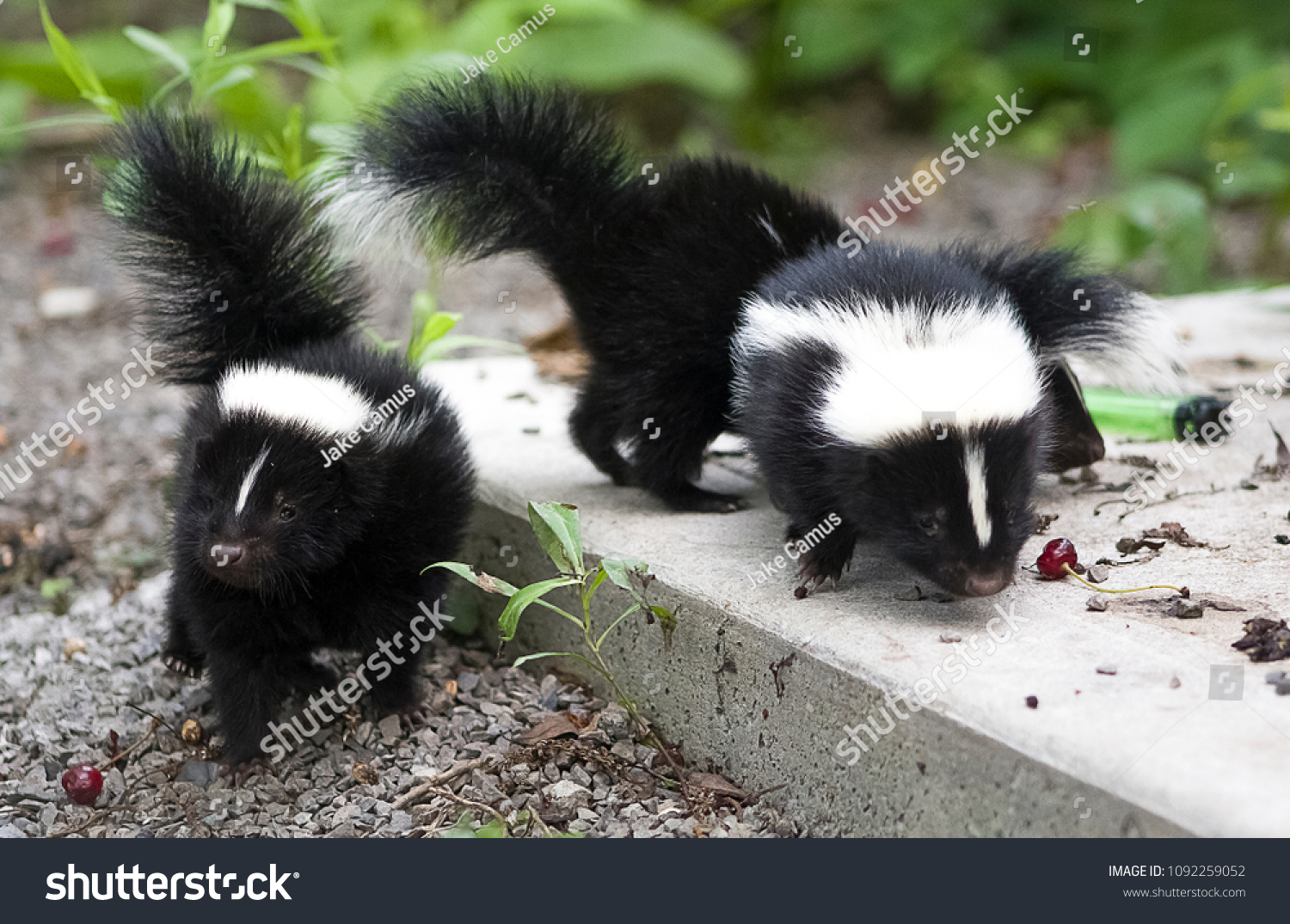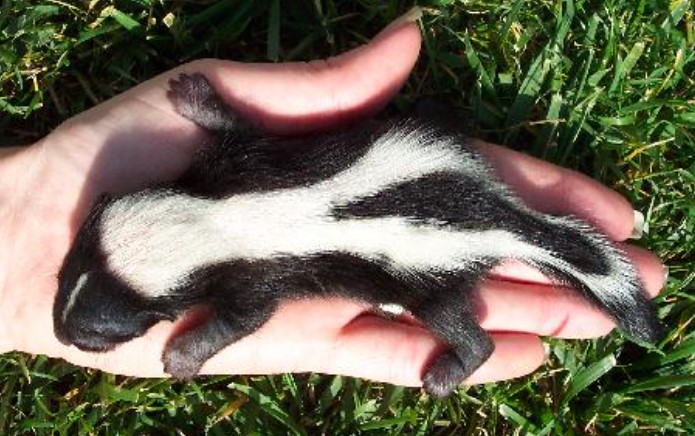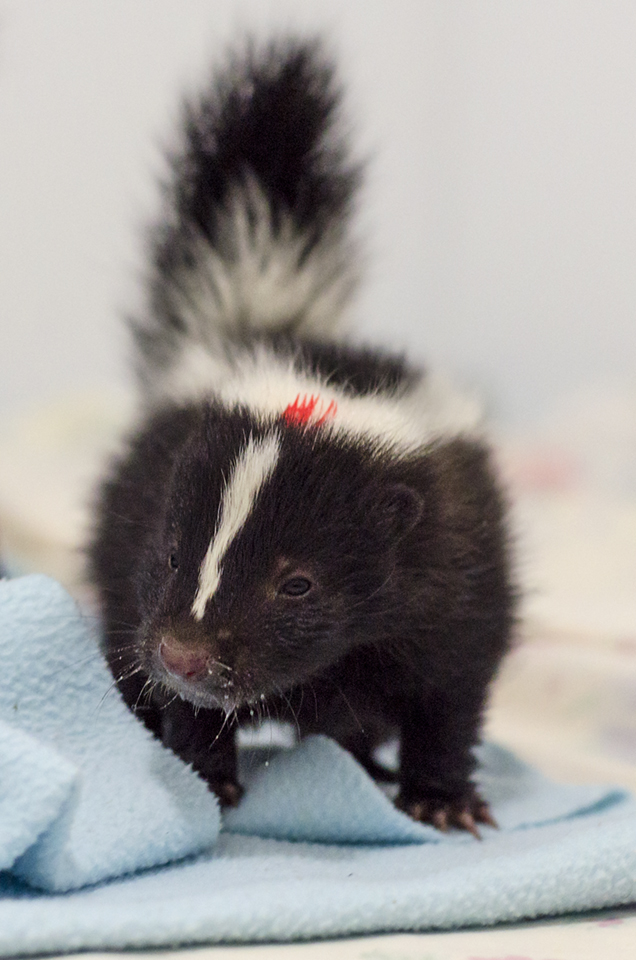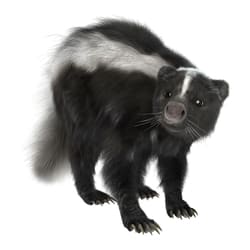when do skunks have babies in alberta
By two months old their mother starts to wean them and takes them outside the den to hunt and scavenge for food on their own. Be careful as you dont want to orphan the baby skunks.

Group Baby Skunks Near Public Trail Stock Photo 1092259052 Shutterstock
Around July each year many lawns and alleys around the province become unintentional maternity wards for perhaps the stinkiest of Albertas mammals.

. Grass is generally accumulated and brought into the maternal sanctum for bedding. A skunk will have a nest of babies under a shed or porch that is close to a ready source of food and if the place is large and durable enough to accommodate it and its babies. People enjoy visiting Alberta campgrounds.
AIWC cares for A LOT of skunks. And while they have quite a reputation. The age potential for a skunk is about 10 years but few live beyond 3 years in the wild.
During the breeding season a male may travel 64 to 8 km 4 to 5 miles each nightSkunks are dormant for about a month during the coldest part of winter. Skunks can spray their scent glands up to 15 feet. Skunks breed in February and March.
Skunk breeding season has arrived. Trapping and relocation of mother skunks is one of the main reasons we need to admit skunk kits to AIWC. However if this does not work and a person encounters a skunk.
Striped skunks can live up to three years in the wild. Babies The female may have 4 to 8 babies kits in late April or early May. Come visit us at Elevated Experience Camping at Willey West Campground for adventures with friends.
Skunks den in old woodchuck burrows hollow logs wood or rock piles or under buildings and stone walls. Fortunately skunk romance only lasts a short time. Areas that provide dark secure hiding places.
Taking these early steps can help prevent future skunk interactions and dissuade mothers from building a den in your backyard as baby skunks are expected to arrive in late May. Older females come into estrus earlier in the season than younger females and therefore have their litters earlier in the spring. The young remain in the den for about eight weeks.
In the fall skunks feed voraciously building up fat reserves for winter dormancy. Older females also tend to have larger litters. Subsequent to mating female skunks scatter from the winter to find nook to different maternal hiding places.
Skunks typically have a single litter of four to six babies in May-June. The female will dig out a den to house her litter and kits are born in May Skunks can spray their anal glands secretions several times over very long distances before the gland is emptied. Mating occurs in the early spring and mother skunks give birth to litters ranging in size from two to six kittens.
These quiet sounds can alert skunks of peoples presence so that they can run away before an encounter can happen. The babies are skinny blind. You can expect each litter to have about five baby skunksthats could leave you in a very stinky situation if a skunk family decides to take up residence on your property.
McFarland said its breeding season and baby skunks are starting to be born. A skunk living under a shed or deck from April to September should ALWAYS be assumed to be a mother with babies. This could cause the babies to die due to lack of resources and nutrients that the mother would provide 3.
The event is free and will be held at the Alberta Wilderness Association Cottage School on. The skunk smell can remain on skin and pet hair for days weeks and even months. That reputation is not well-founded.
Skunks mate amid February and March. Albert June 19 2017. The juvenile skunks are weaned by the time they emerge from the den and are about eight inches long.
Because skunks are even more defensive when they have their offspring present. Skunk burrows can cause structural weakness in decks porches sheds and. SKUNKS Biology Skunks have become accustomed to humans thriving in semi-open agricultural areas mixed woods meadows and even urban areas.
This is especially important if they have their babies with them. After a sixty day gestation period female skunks give birth to a litter of pups in April or May. The relocation of a skunk may also cause the separation of the mother and its babies especially in the spring and summer months.
Eight baby skunks currently call the Alberta Institute for Wildlife Conservation home but the institute says it expects dozens more through its. Skunks also live under old buildings or rock piles or in hollow tree stumps. Skunks begin to breed in late February or March when they emerge from their dens and the young are usually born in early May.
In the winter it may form a ball of grass and place it at the door of the den to keep out the cold wind. With the onset of cold weather skunks seek out dens becoming inactive for the winter. The skunk uses dried leaves and grass to line the den.
There are typically four to six young in a litter although the number may vary from two to 16. Baby skunks or kits are usually born in May in litters of 4 to 6 and sometimes more. A few females may be mated by one male.
February and March are prime breeding times for skunks and females will start to have babies by early May. Skunks have poor eyesight and as such their awareness of their surroundings is limited. The normal home range of the skunk is 2 to 5 km l2 to 2 miles in diameter.
Young skunks are capable of spraying their defensive stench at little more than one week old and are completely weaned from their mothers after a couple months. It can take over a week before the gland is refilled and ready to be used again Prevention. A pair of baby skunks comfort each other from the danger of an approaching photographer near St.
Most of them will return to their mothers den for their first winter. In most cases skunks will not create nests close to places where human activities are prominent and for this reason it may abandon the nest for another one. Skunks can be found in all Alberta campgrounds because they are native to the province.
First Baby Skunks At Wildcare Wildcare

Blog Baby Skunks Delta Optimist

Skunks Notorious Or Not Skunks Notorious Or Not

Sos Save Our Skunks Alberta Institute For Wildlife Conservation
First Baby Skunks At Wildcare Wildcare
First Baby Skunks At Wildcare Wildcare

Baby Skunk With Mama Baby Skunks Animals Wild North American Animals

Sometimes All You Need Is A Shoulder To Lie On Baby Skunks Pet Rats Skunk

Skunk Whisperer Called To Blackfalds Red Deer Advocate

Why It S Not Always Good To Relocate A Mother Skunk Cbc News

Skunk Facts Identification Control And Prevention Orkin Canada

Why It S Not Always Good To Relocate A Mother Skunk Cbc News

